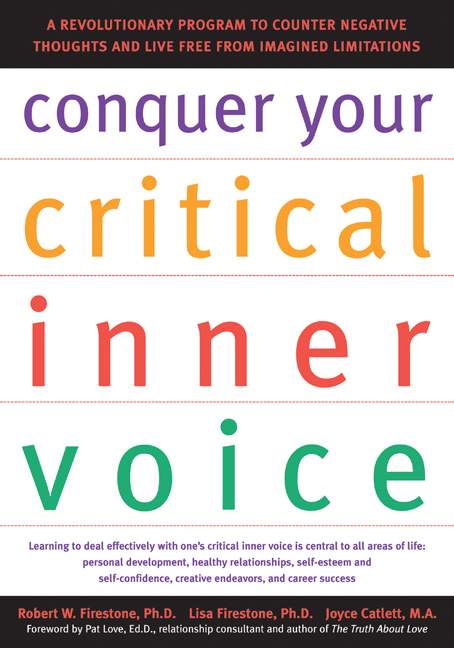By Lisa Firestone, PhD
Very often, our clients’ worst enemy lies within. As therapists, we come up against this enemy regularly. We notice the same thought processes and behavior patterns that lead our clients to self-sabotage. The “critical inner voice” is the language of this destructive internal coach that drives self-limiting behavior. Helping clients identify, challenge, and act against this inner critic are tools that will benefit them in every area of their lives. Here are the five steps to Voice Therapy, a method we developed to help clients conquer their critical inner voice:
Step 1: Identify the content of your clients' negative thought processes. Help them to articulate their self-attacks in the second person (as “you” statements). This will help clients recognize the “voice” as an enemy—as opposed to their real point of view—and to have more compassion for themselves. Encourage the person to articulate the attack as he or she experiences it (e.g., “You are so stupid!" "You can’t do anything right!”) If the person is holding back feelings, encourage him or her to express them.
Step 2: Ask your clients to discuss their insights and reactions to verbalizing the voice. Help them to explore and understand the relationships that may exist between their voice attacks and their early life experiences. This will allow them to develop more compassion for themselves.
Step 3: Have your clients answer back to the voice attack, taking their own side (e.g., "I am not stupid." I am competent and capable of learning.”). Afterwards, it's important for clients to make a rational statement that challenges their inner critic, and to respond with more compassion and perspective—as would a friend of theirs. This will strengthen their sense of self.
Step 4: Help the client to develop insight about how the voice attacks are influencing his or her present-day behaviors.
Step 5: Collaborate with your client to plan changes in these behaviors. Encourage them to not engage in self-destructive behavior dictated by these negative thoughts, and to increase the positive behaviors these critical thoughts discourage. Remind them that challenging this critic will bring up anxiety, but by repeating this exercise and persevering in their actions, they can get closer to their goals and live free of imagined limitations.
 Lisa Firestone, PhD is the Director of Research and Education at The Glendon Association, Senior Editor at PsychAlive.org and is a clinical psychologist in private practice. She is the co-author of several books including Conquer Your Critical Inner Voice and numerous professionals articles and book chapters. Dr. Firestone is an international trainer and consultant on topics that include couple relations, parenting, suicide and violence prevention assessment and treatment. Learn more about her work on www.psychalive.org and www.glendon.org. Join Lisa for her six-week eCourse: Overcome Your Inner Critic: How to Free Yourself from Imagined Limitations
Lisa Firestone, PhD is the Director of Research and Education at The Glendon Association, Senior Editor at PsychAlive.org and is a clinical psychologist in private practice. She is the co-author of several books including Conquer Your Critical Inner Voice and numerous professionals articles and book chapters. Dr. Firestone is an international trainer and consultant on topics that include couple relations, parenting, suicide and violence prevention assessment and treatment. Learn more about her work on www.psychalive.org and www.glendon.org. Join Lisa for her six-week eCourse: Overcome Your Inner Critic: How to Free Yourself from Imagined Limitations

 2024 Peace Playbook: 3 Tactics to Avoid Clashes with Your Partner
2024 Peace Playbook: 3 Tactics to Avoid Clashes with Your Partner